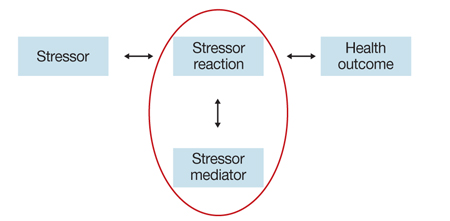J Korean Med Assoc.
2013 Jun;56(6):485-495.
Measuring stress with questionnaires
- Affiliations
-
- 1Department of Family Medicine, Kangbuk Samsung Hospital, Sungkyunkwan University School of Medicine, Seoul, Korea. hcfm.shin@samsung.com
Abstract
- Stress is an area of research that has grown and diversified enormously since the early work of W. E. Cannon and Hans Selye. This development has been accompanied by an accelerated and renewed interest in instruments for evaluating stress and related factors. At present, the questionnaire method is the most popular for stress measurement. However, there is no consensus on how to measure stress because of the diverse scope of stress dynamic. There are many different kinds of questionnaires for measuring stress. And these questionnaires are different according to the various aspects, such as external stressors, individual's sense of control or coping, susceptibility, personality type, and subjective symptoms. Each questionnaire has its own drawbacks as a tool for measuring stress. Therefore choosing the appropriate instruments for evaluating stress objectively is a basic and crucial step for developing effective stress reduction strategies. Another important problem is that many of the questionnaires for measuring stress currently used in the field lack an appropriate cross-cultural adaptation process for the translated version and sufficient evidence of validity and reliability.
Figure
Reference
-
1. Shin HC. Treatment strategy for the patient with stress for family physician. J Korean Acad Fam Med. 2006; 27:Suppl 4. S43–S50.2. Shin HC. Stress counseling. Korean J Health Promot Dis Prev. 2006; Suppl 6. S17–S20.3. Shin HC. Stress measurement tool and clinical application. Korean J Fam Med. 2010; 31:Suppl 11. S350–S356.4. Cohen S, Kessler RC, Gordon LU. Measuring stress: a guide for health and social scientists. New York: Oxford University Press;1995.5. Ice GH, James GD. Measuring stress in humans: a practical guide for the field. New York: Cambridge University Press;2007.6. Kim CH. Questionnaire methods for measuring stress. Korean J Stress Res. 2006; 14:63–68.7. Holmes TH, Rahe RH. The social readjustment rating scale. J Psychosom Res. 1967; 11:213–218.
Article8. Cohen S, Kamarck T, Mermelstein R. A global measure of perceived stress. J Health Soc Behav. 1983; 24:385–396.
Article9. Stone AA, Neale JM. Development of a methodology for assessing daily experience. In : Baum A, Singer JE, editors. Advances in environmental psychology 4. Environment and health. Hillsdale: Lawrence Erlbaum;1982. p. 49–83.10. Lee PS. A methodological research on the measurement of stress related to life events [dissertation]. Seoul: Yonsei University;1984.11. Yim JH, Bae JM, Choi SS, Kim SW, Hwang HS, Huh BY. The validity of modified Korean-translated BEPSI (Brief Encounter Psychosocial Instrument) as instrument of stress measurement in outpatient clinic. J Korean Acad Fam Med. 1996; 17:42–53.12. Koh KB, Park JK. Validity and reliability of the Korean version of the global assessment of recent stress scale. Korean J Psychosom Med. 2000; 8:201–211.13. Koh KB, Park JK. Development of the cognitive stress response scale. J Korean Neuropsychiatr Assoc. 2004; 43:320–328.14. Lee ES, Shin HC, Yang YJ, Cho JJ, Ahn KY, Kim SH. Development of the stress questionnaire for KNHANES: report of scientific study service. Korea Centers for Disease Control and Prevention;2010.15. Chang SJ, Koh SB, Kang D, Kim SA, Kang MG, Lee CG, Chung JJ, Cho JJ, Son M, Chae CH, Kim JW, Kim JI, Kim HS, Roh SC, Park JB, Woo JM, Kim SY, Kim JY, Ha M, Park J, Rhee KY, Kim HR, Kong JO, Kim IA, Kim JS, Park JH, Huyun SJ, Son DK. Developing an occupational stress scale for Korean employees. Korean J Occup Environ Med. 2005; 17:297–317.
Article
- Full Text Links
- Actions
-
Cited
- CITED
-
- Close
- Share
- Similar articles
-
- Questionnaires for Assessing Stress and Mental Health
- Association of Psychological Stress with Telomere Length as a Biomarker of Cellular Aging: A Systematic Review
- Measuring the stress of the surgeons in training and use of a novel interventional program to combat it
- Perception and Ways of Coping with Stress of Sasangin
- Depression Status of Academic High School Students in Seoul: Mediating Role of Entrapment


